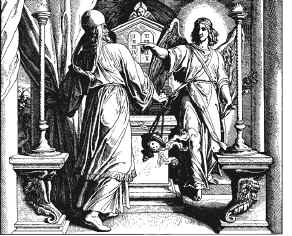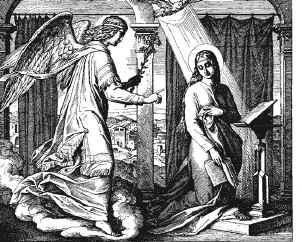The Gospels: Luke 1:1-38 – Announcing the King
Luke begins his book about Jesus with a preface that describes his research methods. His introduction (all one sentence in Greek) is similar to the beginning of Greek historical works:
Many have undertaken to draw up an account of the things that have been fulfilled among us, just as they were handed down to us by those who from the first were eyewitnesses and servants of the word. Therefore, since I myself have carefully investigated everything from the beginning, it seemed good also to me to write an orderly account for you, most excellent Theophilus, so that you may know the certainty of the things you have been taught. (Luke 1:1-4)
Luke does not say that there is anything wrong with previous accounts, which were written by reliable eyewitnesses, but he wants to add his research to strengthen the faith of his readers. “I have checked it out,” he says, “and it is true. I’ll give you the details.”
Ancient writers sometimes dedicated their books to a patron who paid the cost of making copies of the book. Theophilus may be such a sponsor, a person interested in Christianity. Since his name means “lover of God,” any reader who loved God would be invited to read. Luke presents his book as a historically accurate account of “the things that have been fulfilled among us.”
An announcement to Zechariah
Just what are those things? Luke hasn’t yet told us. He begins by putting us into the flow of history—a story of God’s people: “In the time of Herod king of Judea there was a priest named Zechariah, who belonged to the priestly division of Abijah; his wife Elizabeth was also a descendant of Aaron” (v. 5). Luke is writing at least 60 years after these events, but his details suggest that he has done enough research to find the facts. The priests were divided into 24 divisions; each served two one-week periods each year.
“Both of them were upright in the sight of God, observing all the Lord’s commandments and regulations blamelessly. But they had no children, because Elizabeth was barren; and they were both well along in years” (vv. 6-7). Being childless was a disgrace in that society, and some people might assume from it that Zechariah and Elizabeth were not pleasing God. But Luke assures us that they were righteous in every way.
Now that he has introduced the characters, he tells the story:
 |
| Gabriel and Zechariah. Woodcut by Julius Schnoor von Carolsfeld, from Das Buch der Buecher in Bilden. Used by permission of the Wisconsin Evangelical Lutheran Synod. |
Once when Zechariah’s division was on duty and he was serving as priest before God, he was chosen by lot, according to the custom of the priesthood, to go into the temple of the Lord and burn incense. And when the time for the burning of incense came, all the assembled worshipers were praying outside. Then an angel of the Lord appeared to him, standing at the right side of the altar of incense. When Zechariah saw him, he was startled and was gripped with fear. (vv. 8-12)
A priest could offer incense in the temple only once in his lifetime, and some never had that honor at all. Zechariah may have been nervous at his responsibility, and the sudden appearance of the angel frightened him. The angel told him:
Do not be afraid, Zechariah; your prayer has been heard. Your wife Elizabeth will bear you a son, and you are to give him the name John. He will be a joy and delight to you, and many will rejoice because of his birth, for he will be great in the sight of the Lord. He is never to take wine or other fermented drink, and he will be filled with the Holy Spirit even from birth. Many of the people of Israel will he bring back to the Lord their God. And he will go on before the Lord, in the spirit and power of Elijah, to turn the hearts of the fathers to their children and the disobedient to the wisdom of the righteous—to make ready a people prepared for the Lord. (vv. 13-17)
Zechariah had apparently given up hope for a son, but he probably still prayed for God to rescue his people. So the angel tells him the first step in the salvation of Israel: Zechariah will have a son—not just any son, but one who is “great in the sight of the Lord.” As part of his special role set apart for God, he would avoid wine (a rule that Nazirites also followed, but John was probably not a Nazirite). He would be a great prophet, turning the people back to God, fulfilling the prophecies of Malachi 4:5-6 and Isaiah 40:3. After a gap of several centuries, God would again inspire one of his servants to speak to the nation.
How can I be sure?
But Zechariah was reluctant to believe it. He asked: “How can I be sure of this? I am an old man and my wife is well along in years” (v. 18). The angel then gave him reasons to believe—first, that the message was from God, and second, that a miracle would happen to Zechariah himself:
“I am Gabriel. I stand in the presence of God, and I have been sent to speak to you and to tell you this good news. And now you will be silent and not able to speak until the day this happens, because you did not believe my words, which will come true at their proper time” (vv. 19-20). Zechariah was righteous, but he asked for evidence, so God gave him some he could not deny. God keeps his promises, whether they are to a nation or to an individual.
“Meanwhile,” Luke tells us, “the people were waiting for Zechariah and wondering why he stayed so long in the temple. When he came out, he could not speak to them. They realized he had seen a vision in the temple, for he kept making signs to them but remained unable to speak” (vv. 21-22). The priest who offered incense was also supposed to give a blessing, but Zechariah could not.
However, Zechariah kept his commitment, staying in Jerusalem as long as his priestly division was supposed to serve, and then he went home. Elizabeth became pregnant, but kept her pregnancy secret for five months (vv. 23-24). And she rejoiced: “The Lord has done this for me,” she said. “In these days he has shown his favor and taken away my disgrace among the people.” She went from disgrace to favor.
An announcement to Mary
The next event Luke tells us about happened “in the sixth month”—in the sixth month of Elizabeth’s pregnancy. He introduces the characters: “God sent the angel Gabriel to Nazareth, a town in Galilee, to a virgin pledged to be married to a man named Joseph, a descendant of David. The virgin’s name was Mary” (vv. 26-27). She was probably a teenager, with a legally binding commitment to marry Joseph. Joseph may have been much older; we do not know.
 |
| Gabriel and Mary |
Gabriel went to Mary (we do not know how he appeared) and said: “Greetings, you who are highly favored! The Lord is with you” (v. 28). This was an odd greeting, Mary thought, and she “was greatly troubled at his words” (v. 29). She was just an ordinary girl; why should she be given this honor? So Gabriel said:
Do not be afraid, Mary, you have found favor with God. You will be with child and give birth to a son, and you are to give him the name Jesus. He will be great and will be called the Son of the Most High. The Lord God will give him the throne of his father David, and he will reign over the house of Jacob forever; his kingdom will never end. (vv. 30-33)
The angel announced that Mary would have a child, the Son of God, the son of David, a ruler forever. In other words, the Messiah. What a breathtaking announcement! (This is commemorated in March in traditional Christian calendars as the Feast of the Annunciation.) She was to name him Jesus, which means “The Lord is salvation.”
This is not a vague prophecy that in some distant future Mary would become pregnant and have a son. That wouldn’t be much of a prediction, since almost all women had that experience. Mary understood that she would become pregnant right away. “How will this be,” Mary asked the angel, “since I am a virgin?” (v. 34).
Mary’s question sounds similar to Zechariah’s, but Gabriel did not rebuke her for skepticism. Perhaps an old priest was supposed to have more faith than a teenage girl, or perhaps Mary simply had more faith. To answer her question, Gabriel basically repeated his prophecy, and gave Mary a sign by revealing Elizabeth’s pregnancy. Gabriel answered:
The Holy Spirit will come upon you, and the power of the Most High will overshadow you. So the holy one to be born will be called the Son of God. Even Elizabeth your relative is going to have a child in her old age, and she who was said to be barren is in her sixth month. For nothing is impossible with God. (vv. 35-37)
God’s Spirit will cause you to be pregnant, he said, which is why your son will be the Son of God. And if you want further evidence of a miraculous pregnancy, go ask your relative Elizabeth. (We do not know how they were related.) If God can cause an elderly woman to become pregnant, he can also cause a young woman, even a virgin, to become pregnant. He will keep his promise.
Mary’s response is a model for all of us: “I am the Lord’s servant,” she said. “May it be to me as you have said” (v. 38). Her attitude is a great example for all of us. She was willing, even though women who became pregnant before marriage were not treated well in that society. She would go from favor to disgrace—and she did not yet know the heartache involved in being the mother of the Messiah.
Things to think about
- Have I carefully investigated the facts about Jesus? (v. 1)
- What prayer would I most like God to answer for me? (v. 13)
- Is my heart turned toward my children? (v. 17)
- Do I consider myself “highly favored” by God? (v. 28)
- Am I as willing as Mary to let God work in my life? (v. 38)
Author: Michael Morrison

